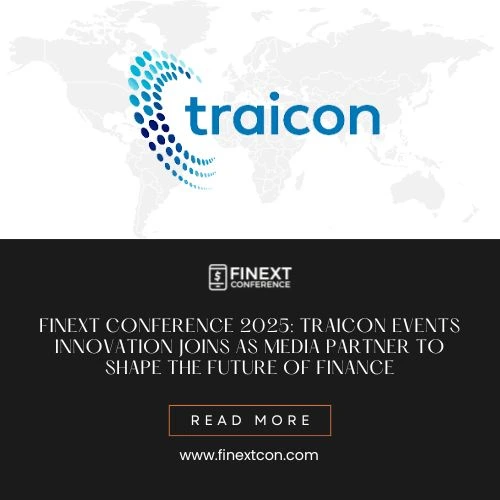The world of finance and technology continues to evolve at an unprecedented pace, and this year, the Finext Conference promises to be a hub for innovation, collaboration, and insights. We are thrilled to announce that ZX PR Wire, a global leader in public relations and news distribution, has joined us as a media partner for this landmark event. About the Finext Conference The Finext Conference is more than just an event; it’s a platform where thought leaders, innovators, and industry disruptors in the financial and technological sectors converge to discuss the trends shaping the future. From fintech startups and blockchain innovators to seasoned financial executives, the Finext Conference connects the brightest minds under one roof to explore groundbreaking solutions and transformative ideas. This year’s conference, scheduled to take place in Pullman Downtown Hotel, Dubai from 10 – 11 Feb 2025, will feature: About ZX PR Wire ZX PR Wire is a renowned name in the world of public relations and news dissemination. Known for their commitment to delivering accurate, timely, and impactful media solutions, ZX PR Wire has been a trusted partner for countless organizations worldwide. Their expertise in driving visibility and engagement makes them an invaluable ally for an event as dynamic as the Finext Conference. What This Partnership Means As a media partner, ZX PR Wire will: This partnership ensures that the insights, discussions, and innovations unveiled at the Finext Conference will reach a global audience, sparking conversations and ideas beyond the conference venue. Why Attend the Finext Conference? If you’re passionate about the future of finance and technology, the Finext Conference is the place to be. Whether you’re an entrepreneur looking for partnerships, a tech enthusiast eager to learn about the latest innovations, or an investor exploring opportunities, this event offers something for everyone. With ZX PR Wire on board, you can expect unparalleled coverage and access to the most significant takeaways, making it easier than ever to stay informed and inspired. Join Us! Don’t miss out on this unique opportunity to be part of a transformative journey in finance and technology. Reserve your spot at the Finext Conference today and experience the future of finance, powered by innovation and collaboration.
Author: user
Exciting News: Laura Szabo Joins Finext Conference 2025 as a Keynote Speaker
The Finext Conference 2025 is gearing up to be the event of the year for the fintech and proptech industries, and we are thrilled to announce that Laura Szabo, a renowned product strategy expert, will be joining us as a keynote speaker. With over 12 years of experience delivering transformative solutions in proptech, digital marketplaces, and fintech, Laura’s presence promises to bring invaluable insights to attendees. A Visionary in Product Strategy Laura Szabo is celebrated for her innovative approach to solving complex industry challenges in emerging and unregulated markets across Europe and Asia. Her expertise in optimizing product-market fit, enhancing customer experiences, and driving sustainable growth has established her as a thought leader in the industry. From her tenure as Chief Product Officer at ingatlan.com, Hungary’s leading property platform, to her role as Head of Real Estate at OLX Portugal, Laura has consistently demonstrated her ability to craft and execute transformative strategies that redefine markets. Her leadership in shaping real estate monetization strategies for OLX Poland further highlights her pioneering contributions to proptech innovation. Bridging Industries: Proptech Meets Fintech Recently, Laura has expanded her expertise into the fintech sector, leveraging her deep understanding of product strategy to address the evolving needs of this dynamic industry. At Finext Conference 2025, she will delve into the intersection of proptech and fintech, exploring how these industries can converge to create seamless, consumer-centric solutions. Her session will provide actionable strategies for optimizing consumer experiences, navigating regulatory complexities, and fostering innovation in fast-growing companies. Attendees can look forward to learning from Laura’s rich experience and forward-thinking insights that have propelled businesses to new heights. Trusted Advisor and Thought Leader Beyond her corporate achievements, Laura is a trusted advisor to startups and organizations seeking to thrive in competitive markets. Her guidance on product development, team building, and agile organizational structures has helped businesses unlock their full potential. Laura’s intellectual rigor, exemplified by her membership in Mensa and her Master’s degree in e-business from Corvinus University of Budapest, underscores her commitment to excellence. She combines her analytical mindset with a passion for innovation, making her a standout speaker for this year’s conference. Join Us at Finext Conference 2025 As the fintech and proptech sectors continue to evolve, the insights of leaders like Laura Szabo are invaluable for staying ahead of the curve. Don’t miss her keynote session at Finext Conference 2025, where she will share her expertise on navigating complex industries and driving sustainable growth. Mark your calendars and join us to connect, learn, and innovate with Laura Szabo and other industry leaders. Stay tuned for more updates on the conference schedule and registration details.
Traicon Events Joins Finext Conference as a Media Partner
The world of finance and technology is evolving rapidly, and platforms like the Finext Conference are paving the way for innovation, collaboration, and knowledge-sharing. This year, the Finext Conference proudly announces Traicon Events as an official media partner, strengthening its reach and impact within the global fintech and financial services community. A Perfect Collaboration Finext Conference has long been recognized as a hub for financial professionals, tech innovators, investors, and thought leaders to converge and exchange groundbreaking ideas. By joining forces with Traicon Events, a leading name in event promotion and media partnerships, Finext is poised to amplify its influence and create an even more engaging experience for attendees and industry stakeholders. Traicon Events has a solid reputation for curating top-tier business summits and conferences, leveraging its extensive network and media expertise to shine a spotlight on transformational events. Their collaboration with Finext will ensure comprehensive coverage of the conference, from live updates and interviews to in-depth analyses of key discussions. What to Expect at the Finext Conference The Finext Conference is known for hosting some of the most influential minds in the financial and technology sectors. This year’s event promises: With Traicon Events’ expertise in event coverage and marketing, every highlight of the conference will be shared with a broader audience, ensuring those who can’t attend in person stay informed and inspired. The Importance of Media Partnerships Media partners like Traicon Events play a pivotal role in expanding the reach of global events. They ensure that: Join the Conversation The collaboration between Finext Conference and Traicon Events is set to elevate this year’s event, bringing unparalleled insights and opportunities to the forefront. Whether you’re a fintech enthusiast, an established industry player, or someone looking to break into the financial world, the Finext Conference is an event you can’t afford to miss. Stay tuned for updates, live coverage, and exclusive insights from Traicon Events, and mark your calendars for one of the most exciting events in the fintech calendar. Follow Finext Conference and Traicon Events on social media for the latest updates and registration details. Let’s innovate, collaborate, and shape the future of finance together!
CFO Tech Outlook Joins FiNext Conference 2025 as a Media Partner: Shaping the Future of Finance
The financial landscape is undergoing a seismic transformation, driven by technological innovation and forward-thinking leadership. FiNext Conference 2025, a premier gathering for finance and technology professionals, is thrilled to announce CFO Tech Outlook as its official media partner. This partnership underscores FiNext’s commitment to connecting industry leaders, innovators, and disruptors to foster groundbreaking ideas and collaborations. The Perfect Synergy: FiNext and CFO Tech Outlook CFO Tech Outlook is a renowned platform that provides deep insights, trends, and strategies for Chief Financial Officers (CFOs) and finance professionals globally. With its comprehensive coverage of fintech advancements, innovative tools, and leadership practices, CFO Tech Outlook aligns perfectly with FiNext’s mission to bridge the gap between finance and technology. As a media partner, CFO Tech Outlook will play a pivotal role in amplifying the event’s reach and impact. Attendees can look forward to real-time updates, expert interviews, and exclusive insights into the event’s most significant moments. What to Expect at FiNext Conference 2025 Scheduled to take place in the vibrant city of Dubai, FiNext Conference 2025 promises a packed agenda: Why This Partnership Matters The collaboration between FiNext Conference and CFO Tech Outlook enhances the event’s value by: Join Us in Dubai FiNext Conference 2025 is set to be a landmark event for anyone passionate about the future of finance and technology. With CFO Tech Outlook onboard as a media partner, the event promises to deliver unparalleled insights and opportunities for growth. Don’t miss your chance to be part of this transformative journey. Register today and be inspired by the innovators shaping the future of finance.
Neha Soni Joins Finext Conference 2025 as a Speaker: Redefining Blockchain Innovation
We are thrilled to announce that Neha Soni, a visionary entrepreneur, investor, and blockchain technology advocate, will be joining the Finext Conference 2025 as a distinguished speaker. Known for her transformative leadership in the blockchain ecosystem and her role as the founder of Corum8, Neha’s participation adds immense value to this premier global gathering of financial and technological leaders. A Visionary in Blockchain and Beyond Neha Soni’s name is synonymous with innovation and excellence. As the founder of Corum8, an award-winning enterprise with a global footprint, she has reshaped how blockchain startups navigate their journeys. Corum8 offers a unique 360-degree solution for blockchain pioneers, encompassing startup acceleration, incubation, investor relations, and technology development. Neha’s expertise extends beyond technology. She is a passionate advocate for empowering entrepreneurs, helping them access vital resources like PR, market making, community building, and marketing. Her holistic approach has cemented Corum8’s reputation as a trusted partner for blockchain startups worldwide. Neha’s Role at Finext Conference At the Finext Conference, Neha will bring her wealth of experience to the stage, sharing insights on: Neha’s session will provide actionable insights for entrepreneurs, investors, and technologists eager to explore blockchain’s transformative potential. Why Neha Soni’s Presence Matters As a globetrotter and seasoned investor, Neha has developed a global perspective, enabling her to forge meaningful connections across industries and geographies. Her passion for blockchain, combined with her experience in technology startups and real estate, offers a unique lens on how these domains intersect to create groundbreaking opportunities. Neha’s journey from a dynamic entrepreneur to a global influencer exemplifies the entrepreneurial spirit that drives Finext Conference. Her story of innovation, resilience, and impact inspires attendees to think beyond boundaries and embrace disruptive ideas. Join Us at Finext Conference 2025 The Finext Conference is the ultimate platform for innovators, leaders, and disruptors in the finance and technology sectors. With Neha Soni joining the stellar lineup of speakers, attendees are guaranteed an enriching experience filled with forward-thinking strategies and real-world applications of cutting-edge technology. Mark your calendars! Join us to witness Neha Soni redefine blockchain innovation at Finext Conference 2025. Let’s explore how her vision and leadership can empower the next generation of pioneers and reshape the future of finance and technology. Register today to secure your spot at this transformative event!
Paula Tavangar: A Visionary Speaker at the Finext Conference
The Finext Conference is poised to be one of the most exciting events for the global fintech community, and this year, we are thrilled to welcome Paula Tavangar as one of our distinguished speakers. Paula brings a wealth of experience and expertise to the stage, with a remarkable career spanning venture capital, quantitative strategies, and fintech innovation. Her insights are sure to inspire and guide attendees through the latest trends in finance, technology, and investment. A Leader in Venture Capital and Quantitative Strategies As Chief Investment Officer at Injaz Capital, Paula Tavangar plays a pivotal role in driving strategic investment initiatives and identifying high-growth opportunities in the market. Her experience in venture capital has helped shape the direction of countless innovative startups, propelling them to success through impactful investments. Before joining Injaz Capital, Paula served as Principal at SwissBorg Ventures, where she focused on scaling the potential of groundbreaking ventures, contributing to the firm’s success in the rapidly evolving fintech landscape. Her strategic approach and forward-thinking perspective have made her a key player in the investment space. Pioneering Fintech Innovation Paula’s entrepreneurial journey is equally impressive. She co-founded Genesis Capital LATAM, where she successfully managed the Quant Arbitrage Fund, a strategy that consistently delivered alpha through cutting-edge quantitative techniques. This demonstrated Paula’s deep expertise in financial engineering, enabling her to leverage advanced algorithms and automated trading systems to achieve superior returns. She also co-founded Wethaq, an Islamic fintech startup that is pioneering Sharia-compliant financial solutions. Through Wethaq, Paula has played an integral role in expanding the horizons of Islamic finance, demonstrating her commitment to developing inclusive and ethical financial solutions. A Thought Leader on the Global Stage Paula’s leadership extends beyond the boardroom. She has served on the World Business Angels Forum (WBAF) Global Startup Committee, where she contributed to the growth and development of startups worldwide. Additionally, her role as a commissioner representing WBAF in the UAE showcased her ability to connect global financial ecosystems and empower the next generation of entrepreneurs. Her extensive network and thought leadership make her a sought-after speaker at major conferences and events. At the Finext Conference, Paula will share her insights on the latest investment trends, the future of fintech, and how emerging technologies are reshaping the finance industry. Why You Shouldn’t Miss Paula Tavangar at the Finext Conference Paula Tavangar is more than just an investment professional; she is a visionary who understands the power of combining technology with finance. Her experience in managing funds, launching startups, and pushing the boundaries of financial innovation will provide invaluable takeaways for conference attendees. Whether you’re an entrepreneur, investor, or fintech enthusiast, Paula’s session at the Finext Conference is an opportunity to learn from one of the leading experts in the field. Her unique perspective on venture capital, fintech, and the future of automated trading will leave you inspired and ready to navigate the next wave of financial innovation. Don’t miss out on this incredible opportunity to hear from Paula Tavangar and other industry leaders… Continue Reading Paula Tavangar: A Visionary Speaker at the Finext Conference
Dr. Lata Rani: A Keynote Speaker at Finext Conference 2025
We are thrilled to announce that Dr. Lata Rani, an esteemed Associate Professor and Program Anchor in the Department of Banking, Financial Services, and Insurance at Delhi Skill and Entrepreneurship University (DSEU), will be joining us as a speaker at the upcoming Finext Conference 2025. With over 15 years of experience in teaching, research, administration, training, and consultancy, Dr. Rani’s insights promise to be invaluable for all participants. A Distinguished Academic Career Dr. Rani’s impressive academic journey is marked by her Ph.D. from Indira Gandhi National Open University, New Delhi, where she graduated with distinction in her coursework. Her commitment to excellence is evident in her academic achievements, including her M.Phil. from Kurukshetra University and a Master of Commerce from Guru Nanak Dev University, Amritsar, where she also graduated with distinction. She is also UGC-JRF-NET Qualified and has undertaken various specialized courses from internationally renowned institutions like Yale University, the University of Geneva, the University of Illinois, and Harvard University, strengthening her expertise in financial markets, portfolio management, and financial accounting. Research, Leadership, and Contributions Throughout her career, Dr. Rani has made significant contributions to the field of research. Her work spans conceptual frameworks and in-depth analyses of diverse financial research topics. She has been recognized as an outstanding educator, receiving Best Teacher Awards for multiple years. As a permanent member of the All India Commerce Association, Dr. Rani has contributed her expertise to various academic forums. Moreover, she has played an active role in reviewing and contributing to technical programs at prominent international conferences. Notably, she has served as a reviewer and technical member for the International Conference on Business, Management and Governance (ICBMG) hosted by The University of Western Australia in 2021 and 2022. Her insights have furthered global discussions on business management and governance. Dr. Rani is also a member of the Advisory Committee of the World Research Society, and she has delivered numerous impactful talks at both academic and industry levels. Her contributions have earned her recognition from institutions worldwide. Dr. Rani at Finext Conference 2025 At Finext Conference 2025, Dr. Lata Rani will bring her expertise to the stage, addressing crucial topics in financial services, risk management, and the latest trends in global finance. Her knowledge of research methodology, financial analysis, and risk management will provide attendees with cutting-edge insights into navigating the complexities of modern finance. As a leader who values integrity, teamwork, and collaboration, Dr. Rani’s talk will undoubtedly be a highlight of the conference. Her approach to leadership in education and research underscores her dedication to driving innovation and knowledge-sharing in the financial sector. We are excited to welcome Dr. Lata Rani as a speaker at Finext Conference 2025 and look forward to her enriching presentation that will inspire professionals, researchers, and academics alike. Don’t miss the opportunity to engage with one of the leading voices in the field of finance and education. Conclusion Dr. Lata Rani’s participation in the Finext Conference 2025 promises to be an enriching experience for all attendees.… Continue Reading Dr. Lata Rani: A Keynote Speaker at Finext Conference 2025
Exciting News: The Market Periodical Joins Finext Conference as a Media Partner
We are thrilled to announce that The Market Periodical, one of the leading names in financial journalism, has joined Finext Conference as an official media partner. This collaboration brings an exciting opportunity to keep all conference attendees, industry professionals, and stakeholders informed and engaged throughout the event. Why This Partnership Matters The Finext Conference, renowned for its focus on financial technologies and innovative solutions, aims to bring together global thought leaders, innovators, and investors to discuss the future of finance. By partnering with The Market Periodical, we’re ensuring that our content reaches a wider audience and that critical updates, interviews, and analysis are shared with professionals who are eager to stay ahead of industry trends. About The Market Periodical The Market Periodical has established itself as a trusted source for up-to-date information in the financial world. Covering a wide array of topics, from emerging fintech startups to global financial markets, the publication has become an essential tool for decision-makers in the finance sector. Their comprehensive analysis and expert opinions make them the perfect media partner for an event that aims to redefine the financial landscape. What to Expect from This Partnership As part of this collaboration, The Market Periodical will provide exclusive coverage of key sessions, interviews with top speakers, and insights into the latest trends shaping the finance world. Attendees can look forward to detailed reports, thought-provoking articles, and in-depth analyses from the event that will be shared across various platforms. Additionally, Finext Conference will benefit from enhanced visibility thanks to the publication’s broad readership. The Market Periodical’s extensive reach ensures that more professionals, investors, and entrepreneurs will be aware of the conference, adding more value to the event. Stay Updated and Connected Through this partnership, attendees will be able to access real-time updates from the event, providing them with all the information they need without missing a beat. Whether you are attending the Finext Conference in person or remotely, you can stay connected and informed through The Market Periodical’s coverage. Conclusion We’re incredibly excited to have The Market Periodical as a media partner for the Finext Conference. Together, we are poised to create an event that not only delivers unparalleled insights but also provides the tools and resources needed to thrive in the ever-evolving world of finance and technology. Stay tuned for more updates, and get ready for an unforgettable experience at Finext Conference 2025! We can’t wait to see you there!
FiNext Conference Welcomes The Coin Republic as a Media Partner
The FiNext Conference, a global nexus for finance and technology, is thrilled to announce its partnership with The Coin Republic as an official media partner for this year’s event. This collaboration underscores the conference’s commitment to fostering insightful dialogue and innovation in the fintech and blockchain industries. About FiNext Conference The FiNext Conference is renowned for bringing together the brightest minds in finance and technology. From groundbreaking startups to established industry leaders, the event offers an unparalleled platform for networking, knowledge-sharing, and collaboration. The conference features keynote speeches, panel discussions, and workshops designed to address the latest trends and challenges in fintech, blockchain, payments, and digital transformation. The Coin Republic: A Leading Voice in Blockchain Media The Coin Republic has established itself as a leading media outlet dedicated to the blockchain and cryptocurrency space. With its in-depth coverage of blockchain trends, cryptocurrency news, and fintech innovations, The Coin Republic has become a trusted resource for industry professionals, investors, and enthusiasts. Their involvement as a media partner will ensure that FiNext’s groundbreaking insights reach a global audience. What This Partnership Brings This strategic partnership will amplify the reach and impact of FiNext Conference 2025. Here’s what attendees and participants can expect: Highlights to Look Forward To Join the Conversation The partnership between FiNext Conference and The Coin Republic signifies a shared vision of driving innovation and shaping the future of finance. Whether you’re an entrepreneur, investor, or enthusiast, this year’s conference is a must-attend event. Stay tuned for updates, and don’t miss the opportunity to be part of a transformative experience. Register now and join us in exploring the next frontier of financial technology! For more information, visit FiNext Conference Website or follow The Coin Republic for live updates and exclusive content.
Melodi Askelöf Joins FiNext Conference 2025 as a Visionary Speaker on Social Fintech and Retail Innovation
The future of financial technology and retail innovation takes center stage at the highly anticipated FiNext Conference 2025 in Dubai, and we are thrilled to announce that Melodi Askelöf, the trailblazing CEO of Satocci, will be a featured speaker. With over 15 years of leadership spanning Retail, Sustainable Banking, Finance, and Telecommunications, Melodi’s transformative insights are set to captivate attendees and redefine the boundaries of Social Fintech. A Leader in Innovation and Sustainability Melodi Askelöf’s journey has been nothing short of extraordinary. Her 2020 science report, “How Responsible Banking Creates Customer Value,” laid the foundation for Satocci, a groundbreaking Retail Technology solution that has revolutionized in-store shopping. By enabling customers to skip the line and pay with a single click, Satocci seamlessly bridges the gap between online convenience and physical store experiences, setting new benchmarks in the Fintech space. Under Melodi’s dynamic leadership, Satocci has garnered global acclaim, including its recognition in the FUTR150’s Top 150 Best Startups in the World (2023) and its recent accolade—the Excellence in Future of Payments and Digital Wallets Award (2024) at the FiNext Conference. Spotlight on Social Fintech As a passionate advocate for sustainability and seamless customer experiences, Melodi is steering Satocci toward the cutting edge of Social Fintech. This emerging domain focuses on integrating retail technology with innovative payment solutions to enhance customer engagement while fostering sustainability. During her session at FiNext 2025, Melodi will share insights on: A Global Platform for Innovation The FiNext Conference has always been a hub for groundbreaking ideas, connecting visionary leaders, innovators, and industry disruptors. With events in major global hubs like Sweden, Amsterdam, Dubai, and Silicon Valley, Satocci has consistently demonstrated its ability to lead from the front. Melodi’s participation as a speaker further reinforces FiNext as the premier platform for knowledge exchange and collaboration in Fintech. Join the Conversation Don’t miss the opportunity to hear directly from Melodi Askelöf at FiNext Conference 2025 in Dubai. Gain unique insights into how Satocci is transforming the retail landscape and shaping the future of payments. Whether you are a fintech enthusiast, a retail professional, or an investor looking for the next big thing, Melodi’s session promises to deliver actionable takeaways and inspiring perspectives. Stay tuned for event updates, speaker schedules, and Satocci’s showcase highlights as we countdown to one of the most significant gatherings in the Fintech calendar. Together with Melodi Askelöf, let’s explore the future of retail, finance, and innovation at FiNext 2025!









